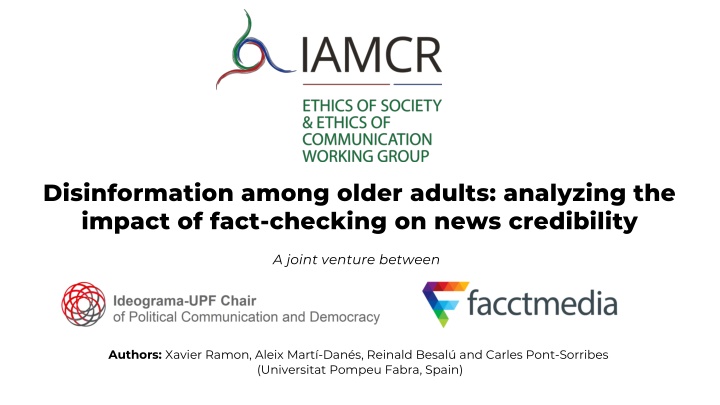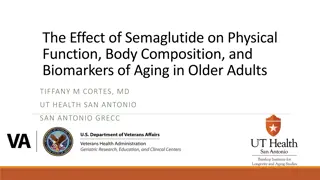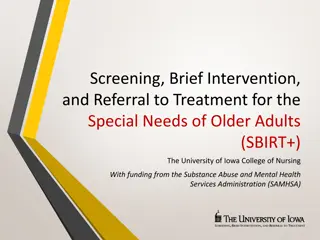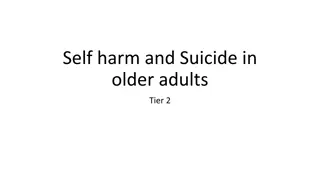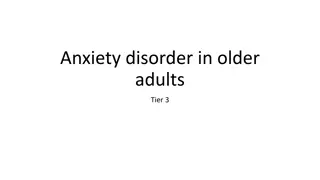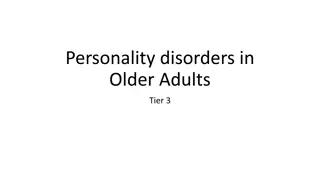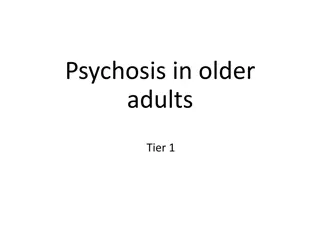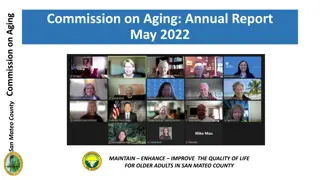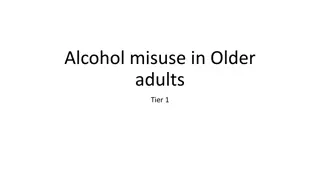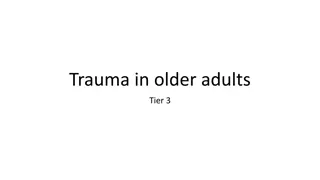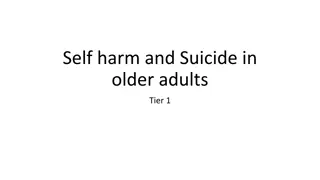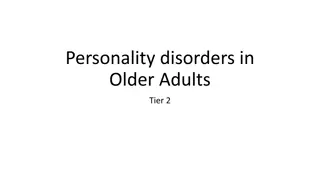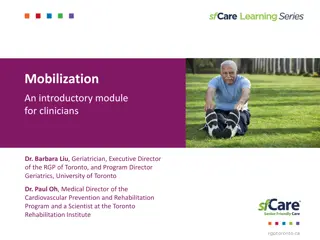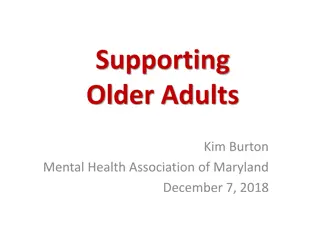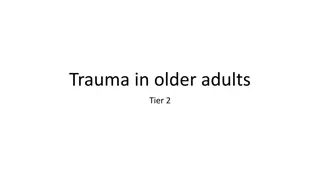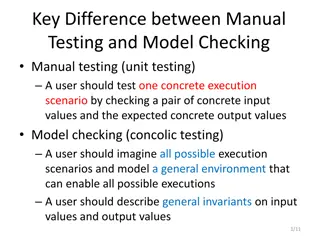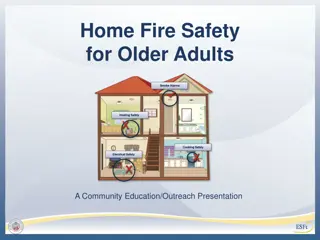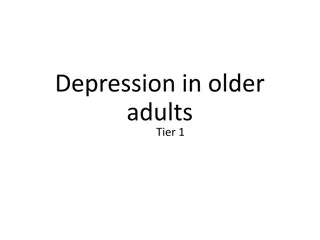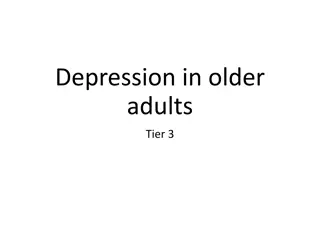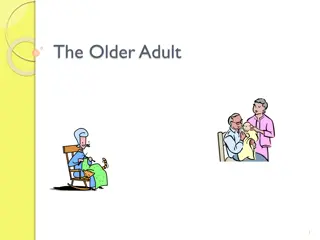Impact of Fact-Checking on Credibility Among Older Adults
Analyzing the impact of fact-checking on news credibility among older adults reveals that age is a key factor in information credibility. Older adults tend to give more credibility to various kinds of information, leading to potential challenges in discerning between true facts and false news. Fact-checking platforms play a critical role in combating disinformation and bridging the digital divide for older populations.
Download Presentation

Please find below an Image/Link to download the presentation.
The content on the website is provided AS IS for your information and personal use only. It may not be sold, licensed, or shared on other websites without obtaining consent from the author.If you encounter any issues during the download, it is possible that the publisher has removed the file from their server.
You are allowed to download the files provided on this website for personal or commercial use, subject to the condition that they are used lawfully. All files are the property of their respective owners.
The content on the website is provided AS IS for your information and personal use only. It may not be sold, licensed, or shared on other websites without obtaining consent from the author.
E N D
Presentation Transcript
Disinformation among older adults: analyzing the impact of fact-checking on news credibility A joint venture between Authors: Xavier Ramon, Aleix Mart -Dan s, Reinald Besal and Carles Pont-Sorribes (Universitat Pompeu Fabra, Spain)
Introduction Disinformation among older adults: analyzing the impact of factchecking on news credibility
2 research lines Information credibility Fact-checking Disinformation among older adults: analyzing the impact of factchecking on news credibility
Age as a key factor In all the studies elaborated by us that follow the research line of information credibility (Besal & Pont-Sorribes, 2021; Besal et al., 2021), the same conclusion is reached: Age is a differential factor in the credibility given to information. Youth are more used to new media and they are more cautious when sharing information than older people. Older people give more credibility to all kinds of information. Disinformation among older adults: analyzing the impact of factchecking on news credibility
Age as a key factor Other previous work has also demonstrated that due to cognitive declines and lower levels of digital literacy, older people have more difficulties in discriminating between true facts and false news and therefore, are more prone to share disinformation (Braschier & Schacter, 2020; Guess et al., 2019; Valera-Ordaz et al, 2022; Hameleers & van der Meer, 2019). Disinformation among older adults: analyzing the impact of factchecking on news credibility
The role of fact-checking platforms Over the last few years, fact-checking platforms have served as critical interventions in the fight against the expansion of false and/or misleading news that threaten democratic wellbeing (Moreno-Gil et al., 2021). Arguably, fact-checking platforms should play a critical role in bridging the digital divide and help older publics navigate through disinformation circulating in high-choice media environments (Kyriakidou et al. 2022, 1). Disinformation among older adults: analyzing the impact of factchecking on news credibility
Methodology Disinformation among older adults: analyzing the impact of factchecking on news credibility
Aim of the study and RQ This research examines the relationship between older adults with disinformation and fact-checking platforms considering the following two research questions: RQ 1: RQ 1: How do older adults evaluate the credibility of information in online press? RQ 2: RQ 2: What is the impact of fact-checking platforms in the credibility that older adults give to news? Disinformation among older adults: analyzing the impact of factchecking on news credibility
Method The study is based on an experimental online survey conducted in October 2022 by YouGov Spain that drew on N=1,203 participants of +60 years. Sample Respondents were divided into 3 symmetrical groups considering key quota variables. Exhibition materials Each of the groups was exposed to four news items about current events Disinformation among older adults: analyzing the impact of factchecking on news credibility
4 Topics (Real content) Immigration Retirement (Real content) Disinformation among older adults: analyzing the impact of factchecking on news credibility
4 Topics (False content) COVID-19 Ukraine War (False content) Disinformation among older adults: analyzing the impact of factchecking on news credibility
Method To avoid any bias, all items were presented as content published by a fictitious news outlet called El Independiente Digital . Each of the experimental groups was asked to evaluate two factors for each piece credibility and shareability using a Likert scale (1-5). Disinformation among older adults: analyzing the impact of factchecking on news credibility
3 experimental groups Group 1 received these items without any verification marks. Groups 2 and 3 were respectively exposed to news that were correctly and incorrectly verified by a fictitious fact-checking platform called Verificamos . Disinformation among older adults: analyzing the impact of factchecking on news credibility
03 Results Disinformation among older adults: analyzing the impact of factchecking on news credibility
Results 1. Older adults demonstrate a good ability to identify disinformative content Disinformation among older adults: analyzing the impact of factchecking on news credibility
Older adults attribute a higher level of credibility to true content and a lower level of credibility to false content. Across the three experimental groups, the news items that obtained higher levels of credibility were those focusing on retirement and immigration, both of true nature. Disinformation among older adults: analyzing the impact of factchecking on news credibility
Results 2. Fact-checking has a relevant impact on older adults assessment of credibility Disinformation among older adults: analyzing the impact of factchecking on news credibility
When respondents were presented with news items that were verified and labelled as false ,their assessment of these items credibility was greatly diminished. In these circumstances, older adults showed greater precautions to believe and share such information. Disinformation among older adults: analyzing the impact of factchecking on news credibility
Results 3. A significant part of the seniors affirm that news should be contrasted through fact-checking platforms Disinformation among older adults: analyzing the impact of factchecking on news credibility
To evaluate the level of knowledge about fact-checking platforms among older adults, the experimental group 1 was asked the following question regarding sources to verify information: We show you a list of sources that can be used to check the authenticity of information. Of all of them, which ones would you turn to verify the news you've read before? Select a maximum of 3 . Disinformation among older adults: analyzing the impact of factchecking on news credibility
Among the different options, participants highlighted official databases and fact-checking platforms as the main sources they would use to verify news. In contrast, friends / relatives and social media spaces more prone to the dissemination of disinformation were generally not considered as valuable options to verify news. Disinformation among older adults: analyzing the impact of factchecking on news credibility
The participants that did not respond fact-checking platforms were faced with this second question: For what reasons would you not use a fact-checking platform to verify the authenticity of the news you have previously read? Select 2 maximum . Part of the sample was not aware about the existence platforms, did not trust them or considered them unnecessary. (n=205) of these Disinformation among older adults: analyzing the impact of factchecking on news credibility
Results Conclusion es 4. Gender divergences in credibility are remarkable Disinformation among older adults: analyzing the impact of factchecking on news credibility
Women are those who rate the credibility of all the news more highly. This indicates a more credulous attitude on the part of female participants. Men didn t approve the credibility of all topics, while women did. This gap is amplified in the age group over 70 years. Disinformation among older adults: analyzing the impact of factchecking on news credibility
Results Conclusion es information in each news piece 5. Political values condition the credibility of the Disinformation among older adults: analyzing the impact of factchecking on news credibility
Depending on the vote, seniors evaluate the credibility of each news piece in a different way. Those who did not vote in the 2019 general elections are those with the highest average credibility (3.16), followed by PP (3.08) and PSOE (2.93) voters. The lowest credibility levels are found among UP, ERC and Junts voters. Disinformation among older adults: analyzing the impact of factchecking on news credibility
Results Conclusion es with credibility and willingness to share the news 6. Education level exposes us to a negative relationship Disinformation among older adults: analyzing the impact of factchecking on news credibility
Those with less studies are the ones who give more credibility to all the news, while respondents with high levels of education show lower levels of credibility. There is a similar relationship with education and willingness to share news. Disinformation among older adults: analyzing the impact of factchecking on news credibility
Concluding remarks 1. Older adults demonstrate a good ability to assess the credibility of information and identify disinformation. 2. False warning labels play a crucial role in alerting older adults to disinformation and preventing them from believing and sharing such news items. Fact-checkers should delve into the use of warning labels as a countermeasure to the spread of disinformation that threatens democratic wellbeing (Moreno-Gil et al., 2021). Disinformation among older adults: analyzing the impact of factchecking on news credibility
Concluding remarks 3. Several participants would avoid using fact-checking platforms because they are not aware of them, do not trust them or think they are unnecessary. > Importance of media literacy activities. 4. Important sociodemographic variables: gender and education levels. 5. In the same vein as previous research (Hameleers & van der Meer 2020; Koch et al., 2022), political ideology is a key factor in the news credibility assessment. Disinformation among older adults: analyzing the impact of factchecking on news credibility
Thank you for your attention
